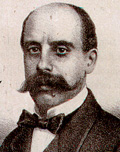 |
Emilio Manuel Castelar y Ripoll
b. 9 Sep 1832, Cádiz
d. 25 May 1899, San Pedro del Pinatar, Murcia |
| Title: |
Presidente del Poder Ejecutivo de la República (President of the Executive Power of the Republic) |
| Term: |
7 Sep 1873 - 3 Jan 1874 |
| Chronology: |
7 Sep 1873, elected, session of the Cortes Constituyentes (Constituent Cortes), Palacio de las Cortes, Madrid [1] |
|
3 Jan 1874, ceased to exercise the functions of office when the government collapsed following violent dispersal of the Cortes by the military [2][3] |
| Names/titles: |
Presidente del Gobierno de la República (this style is used when counter-signing a minister's decree) [7 Sep 1873 - 3 Jan 1874] |
| Biography: |
Received secondary education at Elda, Alicante; studied philosophy at the Instituto de Alicante and University of Madrid, earning doctor's degree in 1853; called for establishment of republican form of government in the articles published in El Tribuno, La Soberanía Nacional and La Discusión; taught history and arts in the Central University of Madrid (1857-1865); founded La Democracia (1864), a newspaper challenging the principles of federalism published in La Difusión run by Francisco Pi y Margall; moved to Paris (1866) after an unsuccessful liberal revolt; elected to the Cortes Constituyentes (Constituent Cortes, 1869-1871) as a deputy for Lérida; voted for República federal during the election of Spanish king (16 Nov 1870); represented Huelva in the Cortes (1871-1873); served as minister of state (12 Feb 1873 - 11 Jun 1873) in the first republican government of Estanislao Figueras; elected to the Constituent Cortes (1873-1874) as a deputy for Huelva; President of the Constituent Cortes (25 Aug 1873 - 9 Sep 1873) [4]; elected President of the Executive Power (7 Sep 1873 - 3 Jan 1874); took harsh measures to combat separatism and anarchy; reorganized the army command and enacted the military criminal code; signed decrees (20 Sep 1873) suspending constitutional guarantees and putting in action the Ley de orden público of 23 Apr 1870; despite warnings of discontent among the Cortes deputies, allowed the Cortes to convene (2 Jan 1874); was defeated in the vote of confidence (between 00:00 and 06:00 on 3 Jan 1874) at the session of the Cortes and witnessed the dispersal of the chamber by the military under General Manuel Pavía y Rodríguez de Alburquerque; declined an offer to form another government made by the coup leaders; returned to the Cortes as a deputy for Barcelona (1876-1878, 1879-1884) and Huesca (1884-1890, 1891-1895, 1896-1899); advocated universal suffrage, religious freedom and compulsory military service; was a founder of the Partido Republicano Posibilista (Possibilist Republican Party), subsequently merging with the Partido Liberal (Liberal Party) in 1893. Biography source: [5] |
| Elections: |
| Candidate |
Vote (7 Sep 1873) |
| Emilio Manuel Castelar y Ripoll |
133 |
| Francisco Pi y Margall |
67 |
| Nicolás Salmerón y Alonso |
2 |
| blank |
3 |
|
| Source for election results: [6] |
| |
| [1] |
Gaceta de Madrid, domingo 7 de Setiembre de 1873. Núm. 250. PP. 1633, 1643-1644. |
| [2] |
"Historia de España", ed. by Ferran Soldevila, 2nd. ed. (Barcelona: Ariel, 1964). Vol. VIII. |
| [3] |
The Cortes convened at a session on 2 Jan 1874, which continued through the early hours of 3 Jan 1874. The vote on the question of confidence for the Castelar government took place between 00:00 and 06:00 on 3 Jan 2006. When the votes were counted, the motion of confidence was lost by 120 votes to 100. The Cortes took a recess to discuss the choice of a new Presidente del Poder Ejecutivo and then proceeded with voting in which the votes were favoring Eduardo Palanca Asensi. During the process of counting the votes the military entered the Palacio de las Cortes and forced the deputies to disperse at about 06:00 3 Jan 1874. By 08:00 General Pavía convened, in the office of the Presidencia de las Cortes, a meeting of "notables", including Francisco Serrano and Antonio Cánovas del Castillo, and charged them with finding a solution to the crisis. Castelar had been followed in the street and caught with an offer to head the new government, but had declined. The meeting continued without Castelar and after Pavía threatened that if no agreement was reached he might have to set up a military dictatorship Serrano was agreed on to be the new Presidente del Poder Ejecutivo. |
| [4] |
Actually presided at the sessions of 25 Aug 1873 - 2 Sep 1873 and 4 Sep 1873 - 5 Sep 1873 inclusively. |
| [5] |
Enciclopedia de Historia de España. Vol. IV. Diccionario biográfico. (Madrid: Alianza Editorial, 1991). P. 200-201. |
| [6] |
Gaceta de Madrid, domingo 7 de Setiembre de 1873. Núm. 250. PP. 1643-1644. |

